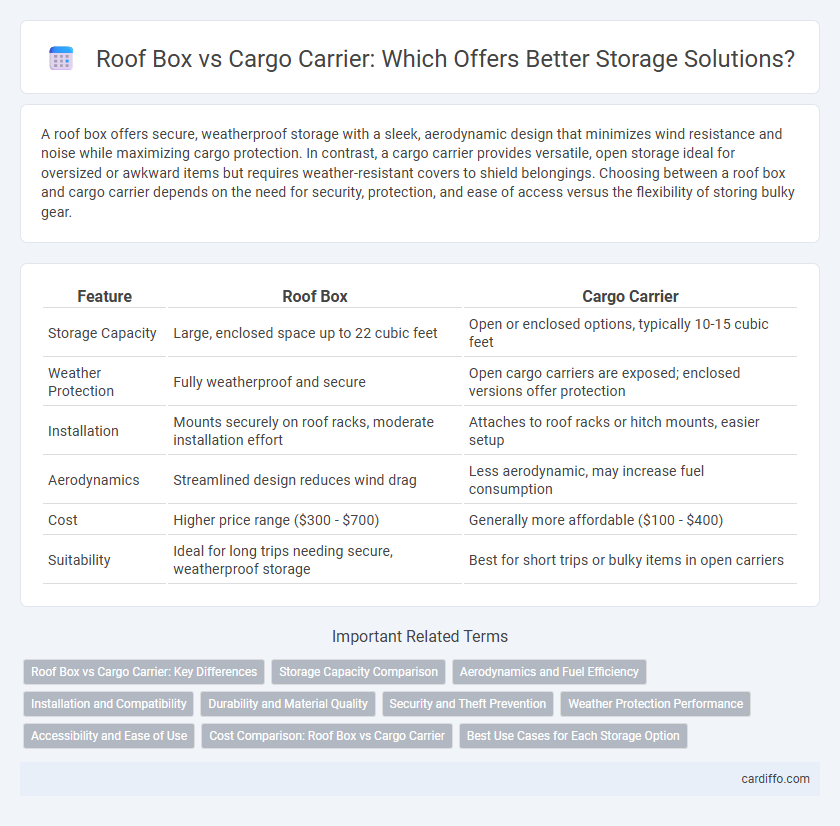A roof box offers secure, weatherproof storage with a sleek, aerodynamic design that minimizes wind resistance and noise while maximizing cargo protection. In contrast, a cargo carrier provides versatile, open storage ideal for oversized or awkward items but requires weather-resistant covers to shield belongings. Choosing between a roof box and cargo carrier depends on the need for security, protection, and ease of access versus the flexibility of storing bulky gear.
Table of Comparison
| Feature | Roof Box | Cargo Carrier |
|---|---|---|
| Storage Capacity | Large, enclosed space up to 22 cubic feet | Open or enclosed options, typically 10-15 cubic feet |
| Weather Protection | Fully weatherproof and secure | Open cargo carriers are exposed; enclosed versions offer protection |
| Installation | Mounts securely on roof racks, moderate installation effort | Attaches to roof racks or hitch mounts, easier setup |
| Aerodynamics | Streamlined design reduces wind drag | Less aerodynamic, may increase fuel consumption |
| Cost | Higher price range ($300 - $700) | Generally more affordable ($100 - $400) |
| Suitability | Ideal for long trips needing secure, weatherproof storage | Best for short trips or bulky items in open carriers |
Roof Box vs Cargo Carrier: Key Differences
Roof boxes provide secure, weatherproof storage with aerodynamic designs that protect belongings from rain, wind, and road debris. Cargo carriers offer versatile, easy-to-install options, often with open or mesh designs, prioritizing convenience and quick access at the expense of exposure to the elements. The choice depends on the need for protection versus accessibility, storage capacity, and vehicle compatibility.
Storage Capacity Comparison
Roof boxes offer significantly higher storage capacity than traditional cargo carriers, with volumes typically ranging from 12 to 22 cubic feet, enabling the transport of bulky items and multiple luggage pieces. Cargo carriers, often open or mesh-style, provide limited space, usually between 5 to 10 cubic feet, best suited for smaller or irregularly shaped items. Choosing a roof box maximizes weather protection and spacious storage, making it ideal for extended travel and heavy packing needs.
Aerodynamics and Fuel Efficiency
Roof boxes feature streamlined designs that significantly reduce air resistance compared to traditional cargo carriers, enhancing overall aerodynamics during travel. Lower drag from roof boxes translates into improved fuel efficiency, often saving up to 10% on fuel consumption over long distances. In contrast, cargo carriers with open or bulky frames create more wind turbulence, increasing drag and fuel costs.
Installation and Compatibility
Roof boxes typically require a roof rack system for secure installation and are designed to fit most crossbars, offering broad compatibility with vehicles. Cargo carriers often feature universal mounting systems that attach directly to trailer hitches, making them ideal for vehicles without roof racks. Both options demand consideration of vehicle specifications and weight capacities to ensure safe and stable use.
Durability and Material Quality
Roof boxes are typically constructed from high-density polyethylene or ABS plastic, offering superior durability and resistance to weather, UV rays, and impact damage compared to fabric cargo carriers. Cargo carriers made from heavy-duty waterproof polyester provide flexibility and easier storage when not in use but may be prone to wear and tear faster than rigid roof boxes. The choice between a hard roof box and a soft cargo carrier depends on the importance of long-term material resilience versus lightweight portability.
Security and Theft Prevention
Roof boxes offer enhanced security with lockable hard shells made from durable materials that resist tampering and theft. In contrast, cargo carriers such as soft bags or open racks typically lack robust locking mechanisms, making them more vulnerable to opportunistic theft. Investing in a roof box with integrated locks significantly improves theft prevention during travel and storage.
Weather Protection Performance
Roof boxes provide superior weather protection with their hard, durable shells that shield contents from rain, snow, and UV rays, ensuring items remain dry and secure. Cargo carriers, often made of soft materials, offer less resistance to harsh weather conditions and may be more susceptible to water penetration and damage. The rigid construction of roof boxes also enhances insulation against temperature extremes, preserving the condition of stored gear more effectively.
Accessibility and Ease of Use
Roof boxes offer streamlined accessibility with lockable hatches and aerodynamic designs that minimize noise and wind resistance during travel. Cargo carriers, typically soft-sided or open baskets, provide flexible loading options but may require more effort to secure items and protect them from the elements. Choosing between the two depends on the frequency of use and the need for weather protection versus versatility in storage space.
Cost Comparison: Roof Box vs Cargo Carrier
Roof boxes typically range from $300 to $1,000, offering aerodynamic designs that enhance fuel efficiency compared to bulkier cargo carriers priced between $100 and $500. Cargo carriers provide a budget-friendly option but may increase wind resistance, leading to higher fuel consumption over long distances. Investing in a roof box delivers better durability and weather protection, potentially reducing replacement costs and roadside maintenance expenses over time.
Best Use Cases for Each Storage Option
Roof boxes offer weatherproof, secure storage ideal for long road trips requiring protection from rain, dust, and debris, making them perfect for camping gear and luggage. Cargo carriers provide versatile, expandable capacity suited for bulky, irregularly shaped items like sports equipment or extra camping chairs, especially useful for short-term trips or when quick access is needed. Choosing between a roof box and cargo carrier depends on the type of cargo and trip duration, with roof boxes favored for protection and cargo carriers for flexibility.
roof box vs cargo carrier Infographic

 cardiffo.com
cardiffo.com